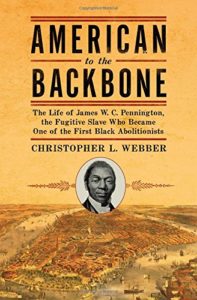American to the Backbone
The incredible story of a forgotten hero of nineteenth century America—a former slave who became a Yale scholar, congregational pastor, and international leader of the Antebellum abolitionist movement.
In 1827, at the age of 19, scared and illiterate, James Pennington escaped from slavery and soon became one of the leading voices against slavery prior to the Civil War. In five years he had become a school teacher and just ten years after his escape, Pennington was ordained to the ministry after studying at Yale. He served congregations in Long Island, Hartford, and Manhattan and traveled three times to England, Scotland, and the continent of Europe as an anti-slavery advocate. He was so respected by European audiences that the University of Heidelberg awarded him an honorary doctorate, making him the first person of African descent to receive such a degree. After the Civil War, he served briefly in Mississippi during reconstruction and then in Portland, Maine, and finally in Jacksonville, Florida.
As he fought for equal rights in America, Pennington’s voice was not limited to the preacher’s pulpit. He wrote the first-ever “History of the Colored People” as well as a careful study of the moral basis for civil disobedience, which would be echoed decades later by Gandhi and Martin Luther King Jr. More than a century before Rosa Parks took her transformational bus ride, Pennington challenged segregated seating in New York City street cars. He was beaten and arrested, but eventually vindicated when the New York State Supreme Court ordered the cars to be integrated. In 1853, as African Americans struggled to define their role in America in the face of growing racism, Pennington was chosen to preside at a Negro National Convention in Rochester, New York. Leading white Americans attempted to define their country in mono-racial terms and many black Americans emigrated to Liberia or Haiti, but Pennington insisted “I am an American to the backbone” and am entitled to the same rights as anyone else.
Often deeply discouraged himself, Pennington retained a delightful sense of humor, intellectual vivacity, and inspiring faith. American to the Backbone brings to life this fascinating, forgotten pioneer, who helped lay the foundation for the contemporary civil rights revolution and inspire generations of future leaders.
Order now from Amazon or Barnes and Noble. Publication date: July 15, 2011.
Comments:
The Wall Street Journal:
“Webber’s vivid account resurrects this astonishing figure, conveying all that he endured and achieved during America’s longest, most harrowing trial.”
Kirkus Reviews:
“A richly detailed, wide-ranging biography of a modestly neglected black religious leader who was born a slave . . Webber’s decision to cast his net widely has produced an important biography as well as insight innto ther pre-Civil War free-black subcluture . . .”
Graham Hodges
George Dorland Langland Jr. Professor of History and Africana Studies, Colgate University
” . . . a very necessary book.”
Sam Waterston, Actor and Director
” . . . a surprise disguised as a book. . . We need to hear this because it can change how we think and act today. Chris Webber tells the story clearly, carefully, thoroughly, wisely. This reading that’s worth it.”
Gordon Burrows
Professor of the History of Christianity, Andover Newton Theological School
” . . . a compelling account of an extraordinary American, one Christopher Webber chronicles through his adroit use of historical sources and imaginative skills as a story teller. . . . We can only be grateful to Webber for his meticulous work in voicing the witness of this compelling American life with such clarity, care, and compassion.”
Sheryl A. Kujawa-Holbrook
Claremont School of Theology
” . . . historical biography at its best . . . accessible, engaging, and scholarly rigorous . . . an important addition to the historiography of the pioneers of the anti-slavery and civil rights movement.”

 Christopher L. Webber
Christopher L. Webber